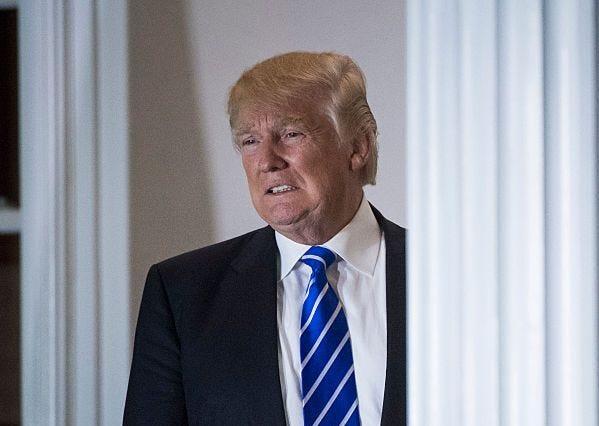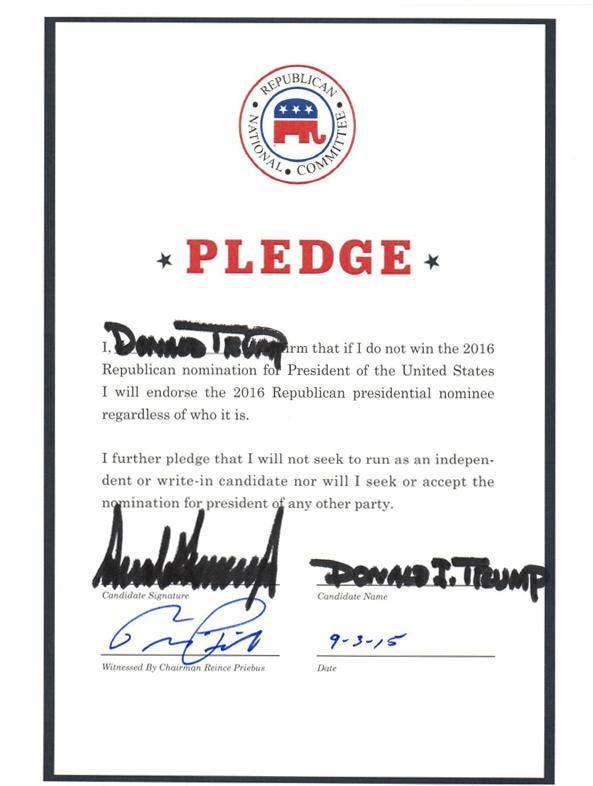On Sunday, Republican National Committee Chair Ronna Romney McDaniel appeared on CNN to discuss, among other things, her plans for the first debate of the 2024 election — in Wisconsin in August.
And, she was asked whether candidates participating in the debate would have to sign what amounts to a loyalty pledge — vowing to support the eventual Republican nominee for president.
Here’s how McDaniel responded:
We haven't put the criteria out, but I expect the pledge will be part of it. It was part of 2016.
I think it's kind of a no-brainer, right? If you're going to be on the Republican National Committee debate stage asking voters to support you, you should say, I'm going to support the voters and who they choose as the nominee.As RNC chair, if I said I wouldn't support the Republican nominee, I would be removed from office. I would. I'd be rightly removed. It'd be part of our bylaws, and I would be kicked out as RNC chair.
Anybody getting on the Republican National Committee debate stage should be able to say, I will support the will of the voters and the eventual nominee of our party.
Yes! It is a no brainer. Except that the frontrunner for the Republican nomination has already said he’s not sure he is going to support the GOP nominee — if it’s not him.
Here’s former president Donald Trump with conservative radio host Hugh Hewitt earlier this month on that very question: “It would depend….It would have to depend on who the nominee was.”
So, um, yeah.
Romney was asked Sunday about Trump’s seeming reluctance to sign any sort of pledge. “Well, he signed it in 2016,” she responded. “He did.”
And he did!
But, there’s a story there.
Trump initially — and very publicly — said no to signing the RNC’s loyalty pledge in the 2016 campaign.
In the first debate of that race — which was in August 2015 — Trump pointedly refused to pledge his allegiance to the party. Here’s how CNN reported it:
Fox Moderator Bret Baier had asked anyone who wouldn’t pledge not to run as an independent to raise their hand. Only Trump did.
The audience booed. Rand Paul started shouting insults. Trump basically shrugged them off.
“I want to win as a Republican, I want to run as the Republican nominee,” Trump told Baier. “I will not make the pledge at this time.”
That move set off widespread worry within the Republican party that Trump would run as an independent — presumably dooming the party’s chances in a general election.
Within a month, Trump had changed his tune. After meeting with then RNC Chair Reince Priebus at Trump Tower, the billionaire businessman made a show of the fact that he had signed the pledge.
“The best way for the Republicans to win is if I win the nomination and go directly against whoever they happen to put up. And for that reason, I have signed the pledge,” Trump said, holding the signed pledge. “So I will be totally pledging my allegiance to the Republican Party and for the conservative principles for which it stands.”
He even tweeted it out — signature and all:
But, Trump being Trump, he didn’t stick to it. By March 2016, in fact, he had abandoned it entirely.
At a town hall in Wisconsin, Trump was asked by CNN’s Anderson Cooper whether he still followed the loyalty pledge. “"No, I don't anymore," Trump responded. "No, we'll see who it is."
And Trump wasn’t the only one! Of the three candidates left in the race at that point, none of them were definitive about backing the eventual nominee.
"I don't make a habit out of supporting people who attack my wife and attack my family,” said Texas Sen Ted Cruz, a reference to Trump’s rhetorical assaults.
Former Ohio Gov. John Kasich was similarly non-committal. “I got to see what happens,” he said. “If the nominee is somebody that I think is really hurting the country, and dividing the country, I can't stand behind them.”
The penalty for the candidates’ hemming and hawing? Absolutely nothing! Trump went on to be the nominee and Cruz, in an act of political self preservation, ultimately endorsed him. (Kasich did not; he voted for John McCain in the 2016 election.)
The pledge then was rendered meaningless in 2016. The frontrunner for the nomination decided that he didn’t want to abide by it any more and so he didn’t. And nothing happened!
As 2016 Republican presidential candidate Carly Fiorina noted sagely of the loyalty pledge: “It’s unenforceable. It is, more than anything else, your word.”
Your word! Ha! We are talking about Donald Trump here!
Look. It’s admirable that McDaniel is trying, for the sake of the party, to ensure that the candidates will unite around the eventual nominee. Politically speaking, it’s the smart and right thing to do.
But, as Donald Trump proved in 2016, he will do what he believes to be good for him at that moment. Signing some piece of paper that expresses his intent to support the eventual Republican nominee is meaningless to him. Because breaking such a pledge is a consequence-free crime.
What is the RNC going to do: Ban Trump from the debate stage? Not bloody likely!
Trump may well sign the loyalty pledge either before, during or after the debate in August. But don’t be fooled: It won’t mean a thing to him.







“So I will be totally pledging my allegiance to the Republican Party and for the conservative principles for which it stands.”
I suppose it’s certainly an out that the Republican Party doesn’t stand for principles of any sort.
It’s probably a no-brainer to realize that Trump is going to cry foul and accuse the GOP of rigging any primaries he loses, too. Good luck with having coddled him for the last 6 plus years, Ronna notRomney.
Actually I suppose it goes back way further since Republicans had no problem with Trump going around on the birther bandwagon.
He’s totally gonna sink whoever gets the nomninatiin